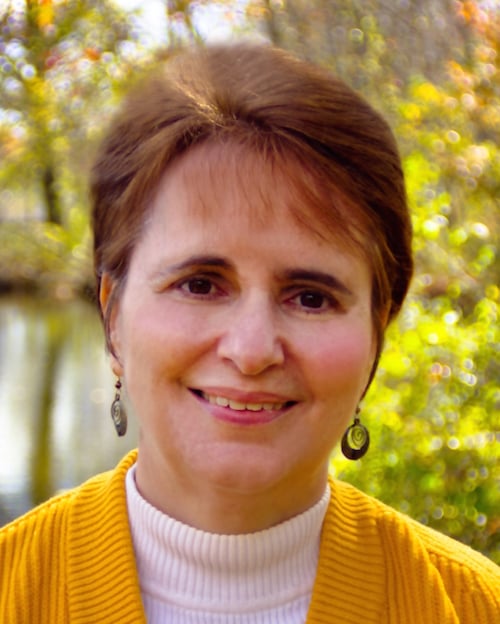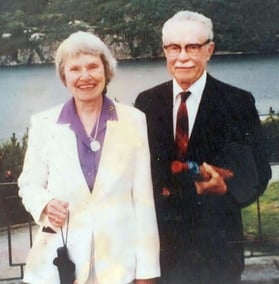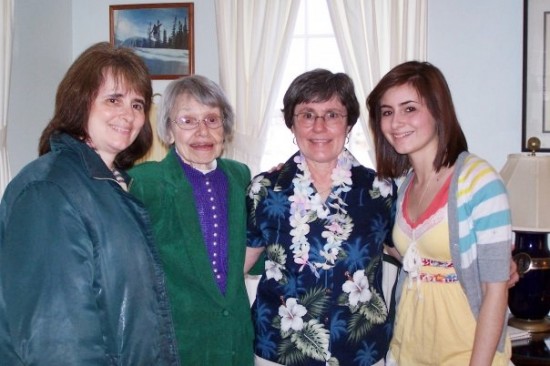Eleven years ago next month, my father passed away. My mother hung on for seven years after losing the love of her life and died in April of 2010. They left behind three children. As I reflect on and pray for them during this time of remembrance for all our dead, I contemplate the fourth commandment.
In my nightly examination of conscience I review the Ten Commandments. When I reach “Honor your father and mother,” I either pause, reminded again of how much I miss them, or I skip over it. After all, doesn’t this commandment refer to how one treats their living parents?
As I review these last eleven years I realize that honoring our parents never ends. We only begin to pay our homage in life through our love, gratitude, faithfulness, and respect. When the roles reverse and we become their caregivers we honor them through our service, showing patience and empathy as they slip into dementia, suffer from disease, or simply lose hope.
We honor them by taking on the difficult and time-consuming tasks of maintaining the family home, hiring and monitoring caregivers, and navigating the maze of doctors, medications, nursing homes, Medicare, and Medicaid. All the while we keep a lid on our emotions until we have time to process how we feel; often that time doesn’t come until after our loved one has passed away.
We struggle to offer comfort even as we need it ourselves. We sit by the bedside, stroking the forehead, holding the hand, kissing the cheek, whispering “I love you,” and if we’re lucky, saying a prayer over them as they draw their last breath. We shed tears as we say goodbye wondering if we will ever again be the same. But we have honored them.
Grief is something we dread and avoid. Yet in our grief, we can honor our parents in death even as we did in life. We do that by continuing to live, allowing the grief journey to take its course. When we ask God to guide us through the process, it becomes a journey of grace.
As the appointed executrix, my sister had shouldered many heavy responsibilities for our parents. She performed her duties with fidelity and integrity but the constant pressure coupled with her grief took their toll. After our parents were gone, she and her husband walked away from their old life, turning over their glass business to their partner. They became “snowbirds,” living in Alabama in the winter and coming back up north in the spring. Along the way my sister sensed a long-dormant part of herself re-awakening.
Before having a family my sister had enjoyed painting. Although she showed talent, she chose to put it aside as she concentrated on her familial and work obligations. Now she has returned to that creative self, employing the artistic skills and keen powers of observation she inherited from our parents. She honors their legacy by developing her talent and sharing her beautiful work with family and friends. Knowing how much her painting meant to our parents provides comfort for her grief.
My brother inherited our father’s precise technical skills, love of gadgets (especially electrical), and his ability to build. It was he who maintained the house, dedicating the many days and hours necessary to assure that everything functioned properly. Keeping up with the family home so that our mother could continue living there honored my father’s wishes.
Like my father, my brother has been dedicated to his career and careful with his money, creating the security my father would have desired for him. Now, as he nears retirement, he has reached the pinnacle of his career working at MIT in Cambridge building mechanisms for the international Space Station. We all smile thinking of the pride our parents would feel at his achievement. Knowing he has honored our parents in this way gives him satisfaction.
My role with our parents was to listen to them, offer comfort and consolation, and to pray for them. I honor them by continuing to do that with others. Just two weeks after my mother passed away I volunteered to bring communion to a homebound woman in our parish. In the four years since, Jackie and I have become close friends, listening to each other, sharing deeply from our spiritual lives, laughing together, praying for each other, and offering each other consolation.
I have worked with my parish to provide communion services at the local retirement home and I am prayerfully considering volunteering for hospice someday. Although I had empathy for my mother and father in their pain, I was just learning how to show it. To honor them, I mean to develop that empathy and offer that emotional connection to those in need.
Grief became the vehicle by which we could continue honoring our parents by the way we live. If you too have lost your parents, take a moment to reflect on your life—how is your living honoring them?
Copyright 2014, Susan Bailey
About the Author

Susan Bailey
Susan Bailey is the author of River of Grace: Creative Passages Through Difficult Times (Ave Maria Press), and Louisa May Alcott: Illuminated by The Message (ACTA Publications), part of their Literary Portals to Prayer series. Along with her blogs Be as One and Louisa May Alcott is My Passion, Susan writes for the Diocese of Worcester newspaper, The Catholic Free Press.




.png?width=1806&height=731&name=CatholicMom_hcfm_logo1_pos_871c_2728c%20(002).png)
Comments